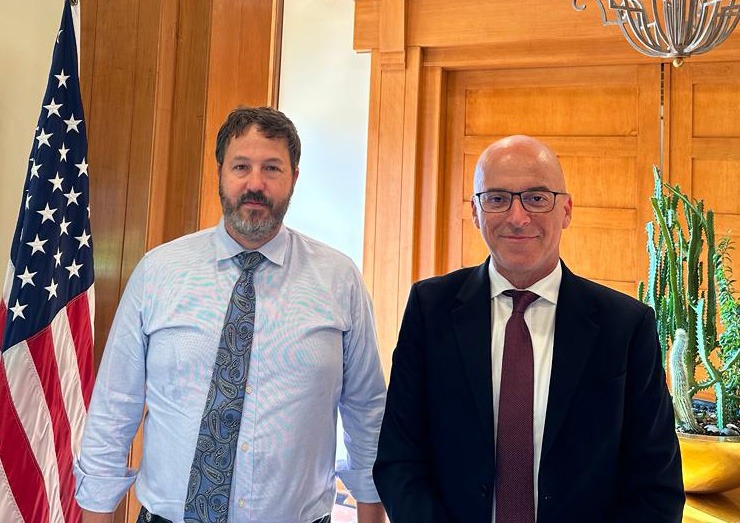Paul Dean, the Principal Deputy Assistant Secretary in the Office of Arms Control, Verification, and Compliance (AVC), who also serves as the US Commissioner to the US-Russian Bilateral Advisory Committee, the compliance and implementation body of the New START Treaty, was on a short visit to Kuwait last week, met with Rabih Kallas from Al Jarida newspaper and explained the purpose and objectives of his visit.
He began by saying that the short visit to Kuwait had been and that he had the opportunity to meet with and hold productive discussions with the Assistant Minister of Foreign Affairs for International Organization Affairs, Minister Plenipotentiary Abdulaziz Al-Jarallah.
“We came here to talk with one of our closest security partners about our office’s work in promoting stability and international issues, including military stability. We value our partners’ perspectives on all of these issues, and the specific thing we came to talk about is the ‘Political Declaration’ on the responsible use of military artificial intelligence. I believe it is a real positive step forward for the international community, in clarifying some of the basic rules of responsibility regarding how countries integrate artificial intelligence into their military applications. I think this is a pressing issue because these technologies are coming online and countries are increasingly using AI in their military applications, and we think it’s important for countries like the United States and Kuwait, which have a commitment to responsibility and multilateralism, to come together around a set of rules about how to do things in a responsible manner and achieve stability. So the focal point of my visit was to talk with the Kuwaiti government about these rules and about what we see as a process moving forward of how countries can continue to work on improving, refining and strengthening these rules over time.
The Political Declaration is a series of basic principles for how countries will use, design, and integrate artificial intelligence into military applications. It is not a legally binding treaty, but rather a set of principles that will guide the behavior of responsible states. I expect that there will be an emerging international consensus around this set of principles. This is something we very much hope that Kuwait, with whom we very much look forward to working, will take on as a close partner on military AI issues and we believe that this cooperation is likely to be enriched by our mutual commitment to this set of principles.”
Speaking about the nature of work done by his office, the visiting US official explained, “The office works on a whole range of military stability issues, so we’re working on nuclear arms control and stability, starting with the New START Treaty, which Russia has unfortunately taken the decision to suspend, which we deeply regret and hope the world regrets as well, because nuclear stability is global issue and in the world’s interest. So, I came to Kuwait to talk about the United States’ commitment to nuclear stability, and indeed President Joe Biden and Secretary of State Antony Blinken and National Security Advisor Jake Sullivan have all been very clear that the United States remains deeply committed to advancing nuclear stability, not just because of the crisis in Europe, but because nuclear stability is most important during times of crisis, so we are committed to discussing this issue and working constructively, even at times when our relationship with the Russians is tense and at a low point. The office also works on multilateral nuclear issues, with the United Nations and in the Conference on Disarmament. We are working on issues related to chemical weapons and the Organization for the Prohibition of Chemical Weapons to ensure that the international community continues to strictly prohibit the use of these weapons. Kuwait has been a very strong partner in this project, and I wanted to highlight that in particular.
We are also working on conventional arms control, conventional stabilization and risk reduction measures in Europe, but also around the world. Finally, we work on emerging technology in military applications, through our commitment to stability, accountability and transparency. Our office is therefore tasked with promoting these measures even in a difficult geopolitical environment such as today. I believe once again that we see the issue of military applications of artificial intelligence as an urgent issue for which we need to establish a set of rules of responsibility and we look forward to working with our Kuwaiti partners to develop this framework in a successful manner. This is an important multi-stakeholder issue and I believe that if this initiative is to succeed, it must work with cooperation and constructive discussion among all stakeholders, including Kuwait.”
He added that it was important for like-minded countries such as Kuwait to present a united voice to demand nuclear stability, demand adherence to anti-chemical weapons standards, and promote the uses of outer space and emerging technologies in a stable and responsible manner. “This is something that no country can do alone and so we believe that these are areas where all countries have a voice and get a vote on, and we believe that our efforts to achieve nuclear stability, our efforts to formulate a normative framework for the responsible use of artificial intelligence will be stronger if they are implemented, in a collective and multilateral manner. Therefore, we look forward to working with our strong partners in Kuwait to ensure that together we take steps that advance these important fundamental issues. And within our field of work on the issue of international stability, I think we see the voice of Kuwait as a very important voice, as a responsible country in joining what I think will be a very useful and positive international effort to clarify the rules of responsible behavior, and this is something that countries must do at the international level, to self-regulate. We also look towards our partners that we mutually commit ourselves to using these emerging technologies responsibly.”

